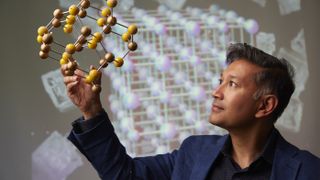Faster charging batteries are possible thanks to in-phone tunnels
Charging in the fast lane

You may think the fast charging technology we have from companies like Qualcomm and Samsung right now is fast, but thanks to a recent technology breakthrough even faster charging could be on the horizon.
According to new research published in the Nature Communications journal, the charging speed of the lithium batteries we currently use in everything from phones and laptops to electric vehicles could be improved by adding charged metal atoms to tunnel structures.
By using a mix of structural experiments and computer simulations, research teams at the Universities of Bath and Illinois discovered that by adding charged potassium into the tunnel-like structure of manganese dioxide they could greatly improve a battery’s performance.
Performance boost
This is because the addition of the positively charged ions improves the electrical conductivity of the batteries, allowing the lithium ions to move faster therefore improving the charge rate of the battery.
According to Professor Saiful Islam from the University of Bath, “understanding this processes is important for the future design and development of battery materials, and could lead to faster charging batteries that will benefit consumer and industry.”
Though we already have faster charging techniques in our smartphones, they aren’t actually the result of improved batteries and instead use carefully controlled current increases which make the most of the battery technology we already have. Unfortunately, it relies on using phones and chargers that have been manufactured to support the technology.
Improving the batteries themselves, if it proved affordable, could make the process of fast charging possible and safer in a wider range batteries, perhaps even the larger lithium batteries that are used in electric vehicles.
Get daily insight, inspiration and deals in your inbox
Get the hottest deals available in your inbox plus news, reviews, opinion, analysis and more from the TechRadar team.
Emma Boyle is TechRadar’s ex-Gaming Editor, and is now a content developer and freelance journalist. She has written for magazines and websites including T3, Stuff and The Independent. Emma currently works as a Content Developer in Edinburgh.
Most Popular


